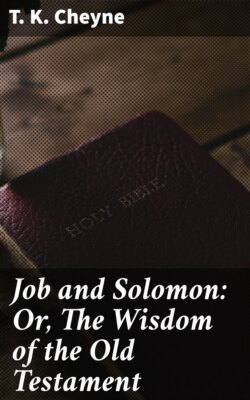Читать книгу Job and Solomon: Or, The Wisdom of the Old Testament - T. K. Cheyne - Страница 13
На сайте Литреса книга снята с продажи.
CHAPTER VI.
THE EPILOGUE AND ITS MEANING.
ОглавлениеTable of Contents
We now come to the dénoûment of the story (xlii. 7-17), against which, from the point of view of internal criticism, much were possible to be said. We shall not, however, here dwell upon the inconsistencies between the epilogue on the one hand and the prologue and the speeches on the other. The main point for us to emphasise is the disappointingness of the events of the epilogue regarded as the final outcome of Job’s spiritual discipline. Surely the high thoughts which have now and then visited Job’s mind, and which, combined with the personal self-revelation of the Creator, must have brought back the sufferer to a state of childlike resignation, stand in inappropriate companionship with a tame and commonplace renewal of mere earthly prosperity. Would it not have been fitter for the hero on whom so much moral training had been lavished to pass with humble but courageous demeanour through the dark valley, at the issue of which he would ‘see God’? It is hardly a sufficient answer that a concession was necessary to the prejudices of the unspiritual multitude; for what was the object of the poem, if not to subvert the dominion of a one-sided retribution theory? The solution probably is that Job in the epilogue is a type of suffering, believing, and glorified Israel. Not only the individual believer, not only all the elect spirits of suffering humanity, but the beloved nation of the poet.—Israel, the ‘Servant of Jehovah’—must receive a special message of comfort from the great poem. In Isa. lxi. 7 we read that glorified Israel is to ‘have double (compensation) instead of its shame;’ comp. Zech. ix. 12, Jer. xvi. 14-18. The people of Israel, according to the limited view of the prophets, was bound indissolubly to the Holy Land. The only promise, therefore, which would be consolatory for suffering Israel, the only possible sign of God’s restored favour, was a material one including fresh ‘children’ and many flocks and herds (Isa. liv. 1, lx. 7). Observe in this connection the phrase, xlii. 10, ‘Jehovah turned the fortunes of Job’ (others, as A. V., ‘turned the captivity of Job’)—the phrase so well known in passages relating to Israel (e.g. Ps. xiv. 7, Joel iii. 1).
The explanation is perhaps adequate. Some, however, will be haunted by a doubt whether the author of the prologue would not have thrown more energy and enthusiasm into the closing narrative. An early reader, probably of Pharisaic leanings, felt the poverty of the epilogue,[67] and sought to remedy it by the following addition in the Septuagint: ‘And Job died, old and full of days; and it is written that he will rise again with those whom the Lord raiseth.’[68] The remainder of the Septuagint appendix testifies only to the love of the later Jews for amplifying Biblical notices (see Chap. VII.) Our own poet painter has also amplified the details of the epilogue, but in how different a way! (Gilchrist’s Life of Blake, i. 332-3).
